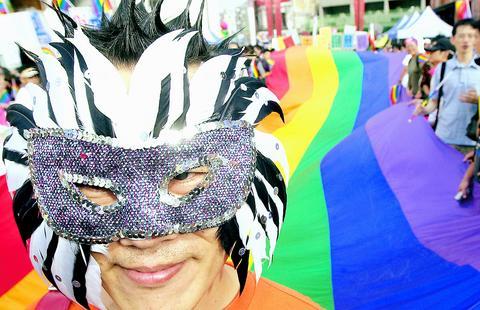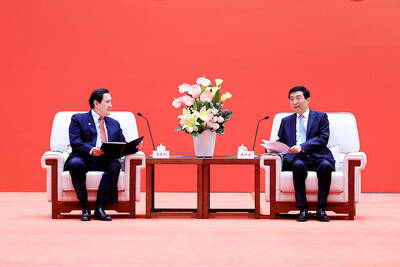At this year's Taiwan Lesbian, Gay, Bisexual, Transgender Pride Parade (
However, parade organizers from the Taiwan Tongzhi Hotline Association (

"Despite the image the media puts forth, we are not all drag queens," said Wu Hsu-liang (

The event starts tomorrow at 1pm, with a street party led by local DJs Victor Cheng and Kay at Chiang Kai-shek Memorial Hall (
The Pride Parade is the most demonstrative expression of the Tongzhi Hotline's work, which includes over-the-phone counseling on topics ranging from relationship trouble to attempted suicide. This year, the Hotline inaugurated a parents and friends of sexual minorities support group -- modeled after the famous Parents and Friends of Lesbians and Gays (PLAG) organization in the US.
Taiwan's Pride Parade, touted as the first ever in the Chinese-speaking world, was held last year and attracted 1,000 lesbians, gays, bisexuals, transgenders and their supporters. Organizers expect to attract more than 2,000 this year.
The parade also promises to distinguish itself on several new fronts. This year's event is centered around four slogans: Citizens with Exceptions (
"People think that our parade is just a copy because other big cities in the world have them," Wu said. "But this time the Pride Parade is really stressing the point that we are all citizens with rights and that all of us can be involved in the civic process of law- and policy-making."
Last year, the Taipei City Government provided NT$720,000 for the event, but the Taiwan Tongzhi Hotline chose not to solicit government funds this year. "The government is a little conservative and we felt pressure from them last time. If it is a government-sponsored event they have more control. This year we had some ideas we wanted to express free of the government," Wu said.
The potentially controversial ideas Wu alluded to might include those stemming from a group new to the Pride Parade roster. This year BDSM, whose members include adherents to bondage, discipline, and sadomasochism, will show their solidarity with the LGBT (transgender) community by joining the parade with groups such as Ri Ri Chun (日日春關懷互助協會), an organized association of sex workers.
Some worry that these unconventional groups and the often exaggerated image of gays projected by the media might further alienate transgender groups from mainstream society.
Roan Ching-yueh (
But those reluctant to support the gay movement on moral grounds might rather look to the profit principle for persuasion. Even famously conservative Singapore is jumping on the gay band-wagon, hoping that the so-called "pink dollar" will bolster the economy through gay tourism.
In August, a gay sponsored event that coincided with Singapore's National Day raked in over US$6 million and attracted over 2,500 foreign visitors. Singapore has even put economists on the job. They found that acceptance of gay culture can, in fact, help transform the city-state into a creative, idea-driven economy.
Wu said the Taiwanese government, if only for economic reasons, would be wise to join the Pride Parade in Taipei. "Of course we invite government officials, but we also would like them to walk with us and show their support, with more than just words and nice speeches."
At this time last year, when the US government was making strides toward banning gay marriage, gay rights supporters championed in vain for the Taiwanese Ministry of Justice's proposed Protection of Human Rights Basic Act (
Cautious supporters of the Taiwanese gay rights movement, like author Roan, think that the very idea of a gay parade in Taiwan warrants reconsideration.
"I question whether or not the parade is suitable for Taiwanese society. We have to consider what Taiwanese gays really need. Western gays needed to build a strong bond and centralized community, but in Taiwan this is not very necessary."
Roan might try running that idea past a computer science student at National Taiwan University who goes by the name of Kevin. He said that before he found other gay friends on the Internet he felt isolated and had "dark thoughts." It was precisely the community he found that he said "helped me get through and come out to my parents."
Whatever reservations one might have about the cultural or philosophical limitations of a gay rights movement in Taiwan, the Pride Parade symbolizes a degree of freedom that Taiwan's homosexual cousins in China are light-years away from achieving. And political, historical, and moral considerations aside, the parade promises to be a colorful and entertaining fete filled with boas, leather, speedos and even the average gay next door.
For your information :
What: Taiwan Lesbian, Gay, Bisexual, Transgender Pride Parade (
When: Saturday, from 1pm to 5pm
Where: Assemble at Chiang Kai-shek Memorial Hall
For more details: See a map of the Pride Parade route and information on how to donate to the parade and Taiwan Tongzhi Hotline at: http://1106.bdsm.com.tw/ (Chinese and English)
Taiwan Tongzhi Hotline Association: www.hotline.org.tw. Call (02) 2392 1970 or (02) 2392 1890

The canonical shot of an East Asian city is a night skyline studded with towering apartment and office buildings, bright with neon and plastic signage, a landscape of energy and modernity. Another classic image is the same city seen from above, in which identical apartment towers march across the city, spilling out over nearby geography, like stylized soldiers colonizing new territory in a board game. Densely populated dynamic conurbations of money, technological innovation and convenience, it is hard to see the cities of East Asia as what they truly are: necropolises. Why is this? The East Asian development model, with

Desperate dads meet in car parks to exchange packets; exhausted parents slip it into their kids’ drinks; families wait months for prescriptions buy it “off label.” But is it worth the risk? “The first time I gave him a gummy, I thought, ‘Oh my God, have I killed him?’ He just passed out in front of the TV. That never happens.” Jen remembers giving her son, David, six, melatonin to help him sleep. She got them from a friend, a pediatrician who gave them to her own child. “It was sort of hilarious. She had half a tub of gummies,

The wide-screen spectacle of Formula One gets a gleaming, rip-roaring workout in Joseph Kosinski’s F1, a fine-tuned machine of a movie that, in its most riveting racing scenes, approaches a kind of high-speed splendor. Kosinski, who last endeavored to put moviegoers in the seat of a fighter jet in Top Gun: Maverick, has moved to the open cockpits of Formula One with much the same affection, if not outright need, for speed. A lot of the same team is back. Jerry Bruckheimer produces. Ehren Kruger, a co-writer on Maverick, takes sole credit here. Hans Zimmer, a co-composer previously, supplies the thumping

There is an old British curse, “may you live in interesting times,” passed off as ancient Chinese wisdom to make it sound more exotic and profound. We are living in interesting times. From US President Donald Trump’s decision on American tariffs, to how the recalls will play out, to uncertainty about how events are evolving in China, we can do nothing more than wait with bated breath. At the cusp of potentially momentous change, it is a good time to take stock of the current state of Taiwan’s political parties. As things stand, all three major parties are struggling. For our examination of the